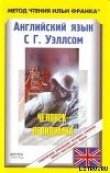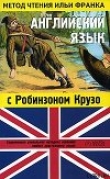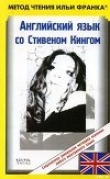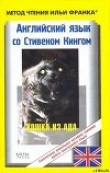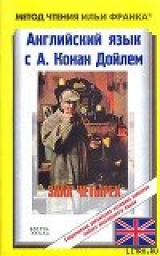
Текст книги "Английский язык с Шерлоком Холмсом. Знак четырех (ASCII-IPA)"
Автор книги: Артур Конан Дойл
Соавторы: Илья Франк,Михаил Сарапов
Жанры:
Языкознание
,сообщить о нарушении
Текущая страница: 7 (всего у книги 31 страниц) [доступный отрывок для чтения: 12 страниц]
«You will excuse me, Mr. Sholto,» said Miss Morstan (извините, мистер Шолто, – сказала мисс Морстен), "but I am here at your request to learn something which you desire to tell me (но я нахожусь здесь по вашей просьбе, чтобы узнать то, что вы желаете сказать мне; to learn – учиться; учить; узнавать; to desire – испытывать сильное желание). It is very late (уже очень поздно), and I should desire the interview to be as short as possible (и мне бы хотелось, чтобы эта беседа заняла как можно меньше времени: «была такой короткой, как только возможно»)."
"At the best it must take some time," he answered (даже в лучшем случае она должна занять какое-то время, – сказал он); "for we shall certainly have to go to Norwood and see Brother Bartholomew (так как нам, конечно, придется съездить в Норвуд повидать брата Бартоломью). We shall all go and try if we can get the better of Brother Bartholomew (мы все поедем и попытаемся убедить брата Бартоломью: «и попытаемся, не сможем ли мы совладать с братом»; to get the better of – оказаться в выигрышном положении; победить, справиться). He is very angry with me for taking the course (он очень сердит на меня за то, что я выбрал образ действия; course – курс, направление; линия поведения, образ действия) which has seemed right to me (который мне казался правильным). I had quite high words with him last night (я изрядно с ним повздорил вчера вечером; high words – гневные слова; разговор в повышенных тонах). You cannot imagine what a terrible fellow he is when he is angry (вы не можете представить, как он ужасен: «какой он ужасный парень», когда сердится)."
desire [dI'zaI@], course [kO:s]
«You will excuse me, Mr. Sholto,» said Miss Morstan, «but I am here at your request to learn something which you desire to tell me. It is very late, and I should desire the interview to be as short as possible.»
"At the best it must take some time," he answered; "for we shall certainly have to go to Norwood and see Brother Bartholomew. We shall all go and try if we can get the better of Brother Bartholomew. He is very angry with me for taking the course which has seemed right to me. I had quite high words with him last night. You cannot imagine what a terrible fellow he is when he is angry."
"If we are to go to Norwood (если нам предстоит отправиться в Норвуд) it would perhaps be as well to start at once," I ventured to remark (то, возможно, нам лучше отправиться немедленно, – отважился я заметить; to venture – рисковать; отважиться).
He laughed until his ears were quite red (он рассмеялся так, что у него покраснели уши: «пока его уши не были совершенно красные»). «That would hardly do,» he cried (едва ли это возможно, – вскричал он; that would not do – так не пойдет). "I don't know what he would say (не знаю, что бы он сказал) if I brought you in that sudden way (если бы я привел вас столь внезапно: «столь внезапным образом»). No, I must prepare you by showing you how we all stand to each other (нет, я должен подготовить вас, показав вам, в каком положении мы находимся относительно друг друга; to stand – стоять; находиться в определенном состоянии). In the first place, I must tell you that there are several points in the story (во-первых, должен сказать вам, что есть несколько моментов в этой истории) of which I am myself ignorant (относительно которых я сам в неведении; ignorant – невежественный; несведущий, незнающий). I can only lay the facts before you (я только могу изложить вам факты; to lay – класть, положить; представлять, передавать на рассмотрение) as far as I know them myself (насколько я сам знаю их).
"My father was, as you may have guessed, Major John Sholto, once of the Indian army (мой отец был, как вы, вероятно, догадались, майор Джон Шолто, до отставки офицер армии в Индии: «когда-то индийской армии»). He retired some eleven years ago (он вышел в отставку около одиннадцати лет назад), and came to live at Pondicherry Lodge in Upper Norwood (и поселился в Пондичерри-Лодж в Верхнем Норвуде). He had prospered in India (он преуспел = разбогател в Индии), and brought back with him a considerable sum of money (и привез с собой значительную сумму денег; to bring – приносить, привозить), a large collection of valuable curiosities (большую коллекцию ценных сувениров), and a staff of native servants (и штат индийских слуг; native – родной, исконно присущий; туземный, местный). With these advantages he bought himself a house (на эти средства: «используя эти преимущества» он купил себе дом; advantage – преимущество; to buy – покупать), and lived in great luxury (и жил в большой роскоши). My twin-brother Bartholomew and I were the only children (мой брат-близнец Бартоломью и я были единственными детьми).
laugh [lA:f], brought [brO:t], guess [ges], curiosity [,kju@rI'Os@tI]
«If we are to go to Norwood it would perhaps be as well to start at once,» I ventured to remark.
He laughed until his ears were quite red. "That would hardly do," he cried. "I don't know what he would say if I brought you in that sudden way. No, I must prepare you by showing you how we all stand to each other. In the first place, I must tell you that there are several points in the story of which I am myself ignorant. I can only lay the facts before you as far as I know them myself.
"My father was, as you may have guessed, Major John Sholto, once of the Indian army. He retired some eleven years ago, and came to live at Pondicherry Lodge in Upper Norwood. He had prospered in India, and brought back with him a considerable sum of money, a large collection of valuable curiosities, and a staff of native servants. With these advantages he bought himself a house, and lived in great luxury. My twin-brother Bartholomew and I were the only children.
"I very well remember the sensation which was caused by the disappearance of Captain Morstan (я очень хорошо помню сенсацию, которую произвело исчезновение капитана Морстена; sensation – ощущение, чувство; сенсация). We read the details in the papers (мы прочитали подробности в газетах), and, knowing that he had been a friend of our father's (и, зная, что он был другом нашего отца), we discussed the case freely in his presence (активно обсуждали этот случай в его присутствии; freely – свободно; открыто, откровенно). He used to join in our speculations (он частенько участвовал в наших спекуляциях; to join – соединять, объединять; присоединяться) as to what could have happened (относительно того, что могло произойти). Never for an instant did we suspect (ни на мгновение мы не подозревали) that he had the whole secret hidden in his own breast (что весь секрет таился в его собственной груди; to hide – прятаться; прятать, скрывать), – that of all men he alone knew the fate of Arthur Morstan (что из всех людей на земле он один знал судьбу Артура Морстена; fate – рок).
"We did know, however, that some mystery, – some positive danger – overhung our father (мы знали, однако, что тут была какая-то тайна, – какая-то явная опасность угрожала нашему отцу; positive – позитивный, реальный; несомненный; to overhang – нависать; угрожать). He was very fearful of going out alone (он очень боялся выходить из дома в одиночку; fearful – вселяющий страх; испытывающий страх), and he always employed two prize-fighters to act as porters at Pondicherry Lodge (а в Пондичерри-Лодж швейцарами у него постоянно работали два боксера-профессионала; to employ – держать на службе, иметь в штате; prize-fighter – профессиональный боксер; to act – действовать, поступать; работать, служить в качестве). Williams, who drove you to-night, was one of them (Вильямс, который привез вас сегодня, – один из них; to drive – ездить; везти). He was once light-weight champion of England (он когда-то был чемпионом Англии в легком весе). Our father would never tell us what it was he feared (наш отец никогда не говорил нам, чего он боялся), but he had a most marked aversion to men with wooden legs (но у него было стойкая антипатия к людям на деревянной ноге; marked – отмеченный, маркированный; явный, заметный; aversion – отвращение, антипатия). On one occasion he actually fired his revolver at a wooden-legged man (однажды: «в одном случае» он даже выстрелил из револьвера в человека на деревянной ноге; occasion – возможность, случай; происшествие; actually – фактически, на самом деле; to fire – зажигать; стрелять), who proved to be a harmless tradesman (который оказался невинным коммивояжером; to prove – доказывать; оказываться; harmless – безвредный, безобидный; невинный; tradesman – торговец) canvassing for orders (пытавшимся получить заказ; to canvass – обсуждать; собирать заказы; order – порядок; заказ). We had to pay a large sum to hush the matter up (нам пришлось заплатить большую сумму, чтобы замять дело; to hush up – замалчивать, скрывать). My brother and I used to think this a mere whim of my father's (мой брат и я привыкли считать это простой причудой отца; mere – простой, всего лишь; whim – прихоть, каприз; причуда), but events have since led us to change our opinion (но то, что случилось с тех пор, заставило изменить нас наше мнение; event – событие; происшествие; to lead – вести; приводить к).
detail ['di:teIl], breast [brest], danger ['deIndZ@], weight [weIt]
"I very well remember the sensation which was caused by the disappearance of Captain Morstan. We read the details in the papers, and, knowing that he had been a friend of our father's, we discussed the case freely in his presence. He used to join in our speculations as to what could have happened. Never for an instant did we suspect that he had the whole secret hidden in his own breast, – that of all men he alone knew the fate of Arthur Morstan.
"We did know, however, that some mystery, – some positive danger – overhung our father. He was very fearful of going out alone, and he always employed two prize-fighters to act as porters at Pondicherry Lodge. Williams, who drove you to-night, was one of them. He was once light-weight champion of England. Our father would never tell us what it was he feared, but he had a most marked aversion to men with wooden legs. On one occasion he actually fired his revolver at a wooden-legged man, who proved to be a harmless tradesman canvassing for orders. We had to pay a large sum to hush the matter up. My brother and I used to think this a mere whim of my father's, but events have since led us to change our opinion.
"Early in 1882 my father received a letter from India (в начале: «рано в» 1882 года мой отец получил письмо из Индии) which was a great shock to him (которое сильно потрясло его: «которое было для него сильным шоком»). He nearly fainted at the breakfast-table when he opened it (он чуть не упал в обморок за столом во время завтрака, когда открыл его), and from that day he sickened to his death (и с этого дня он захворал, что и привело к его смерти: «заболел до смерти»; to sicken – заболевать). What was in the letter we could never discover (что было в письме, мы так никогда и не смогли обнаружить), but I could see as he held it that it was short and written in a scrawling hand (но я смог увидеть, когда он его держал, что оно было коротким и написано каракулями; to hold – держать; to scrawl – писать наспех; писать неразборчиво; писать каракулями, закорючками; hand – рука; почерк). He had suffered for years from an enlarged spleen (он годами страдал от увеличенной селезенки), but he now became rapidly worse (но теперь его состояние начало быстро ухудшаться; to become – становиться; rapidly – быстро; worse – хуже), and towards the end of April we were informed that he was beyond all hope (и к концу апреля нам сообщили, что ни малейшей надежды на выздоровление больше не было: «что он был за пределами всякой надежды»), and that he wished to make a last communication to us (и что он желал попрощаться с нами: «сделать последнее общение с нами»).
"When we entered his room (когда мы вошли в комнату) he was propped up with pillows and breathing heavily (он, тяжело дыша, сидел на кровати, опираясь на подушки; to prop – подпирать; pillow – подушка). He besought us to lock the door and to come upon either side of the bed (он попросил нас запереть дверь и подойти к кровати: «к каждой стороне кровати»; to beseech – заклинать, просить). Then, grasping our hands, he made a remarkable statement to us (затем, схватив нас за руки, он сделал удивительное заявление; to grasp – схватывать, хватать; remarkable – замечательный, выдающийся, поразительный; statement – заявление), in a voice which was broken as much by emotion as by pain (голосом, искаженным как эмоциями, так и болью; to break – ломать). I shall try and give it to you in his own very words (я попытаюсь передать его вам его собственными словами).
receive [rI'si:v], worse [w@:s], breathe [bri:D], besought [bI'sO:t]
"Early in 1882 my father received a letter from India which was a great shock to him. He nearly fainted at the breakfast-table when he opened it, and from that day he sickened to his death. What was in the letter we could never discover, but I could see as he held it that it was short and written in a scrawling hand. He had suffered for years from an enlarged spleen, but he now became rapidly worse, and towards the end of April we were informed that he was beyond all hope, and that he wished to make a last communication to us.
"When we entered his room he was propped up with pillows and breathing heavily. He besought us to lock the door and to come upon either side of the bed. Then, grasping our hands, he made a remarkable statement to us, in a voice which was broken as much by emotion as by pain. I shall try and give it to you in his own very words.
"'I have only one thing,' he said, 'which weighs upon my mind at this supreme moment (только одно: «у меня есть только одна вещь», – сказал он, – тяготит мою душу в этот решающий момент; to weigh – взвешивать/ся/; тяготить; mind – разум; дух, душа; supreme – верховный; высший; крайний, последний). It is my treatment of poor Morstan's orphan (это то, как я обошелся с бедной сироткой Морстен; treatment – обращение). The cursed greed which has been my besetting sin through life (проклятая жадность, которая была моим главным грехом всю жизнь: «была моим осаждающим грехом через жизнь»; to curse – проклинать; to beset – осаждать) has withheld from her the treasure (не дала поделиться с ней сокровищами; to withhold – воздерживаться; утаивать, скрывать), half at least of which should have been hers (по крайней мере половина которых должна была принадлежать ей). And yet I have made no use of it myself (и ведь я сам им никак не воспользовался), – so blind and foolish a thing is avarice (алчность слепа и глупа: «такая слепая и глупая вещь жадность»). The mere feeling of possession has been so dear to me (само чувство обладания было настолько дорого мне) that I could not bear to share it with another (что я не мог вынести /даже мысль о том/, чтобы поделиться с кем-то). See that chaplet tipped with pearls beside the quinine-bottle (видите это колье, украшенное жемчугом: «с жемчужинами на кончиках», рядом с бутылочкой с хинином; chaplet – венок, венец; колье, ожерелье; to tip – приставлять или надевать наконечник; образовывать верхушку). Even that I could not bear to part with (даже с этим я не смог: «не смог вынести» расстаться), although I had got it out with the design of sending it to her (хотя я достал его с целью послать ей; design – замысел, план). You, my sons, will give her a fair share of the Agra treasure (вы, мои сыновья, поделитесь с ней справедливой долей сокровища Агры). But send her nothing – not even the chaplet – until I am gone (но не посылайте ей ничего – даже колье, – пока я не умер; gone – умерший, ушедший из жизни). After all, men have been as bad as this and have recovered (в конце концов, случается, что человек так же плох, как и я, и поправляется; to recover – вновь обретать; выздоравливать, излечиваться).
weigh [weI], supreme [su'pri:m], orphan [O:f(@)n], treasure ['treZ@], avarice ['&v@rIs], design [dI'zaIn]
"'I have only one thing,' he said, 'which weighs upon my mind at this supreme moment. It is my treatment of poor Morstan's orphan. The cursed greed which has been my besetting sin through life has withheld from her the treasure, half at least of which should have been hers. And yet I have made no use of it myself, – so blind and foolish a thing is avarice. The mere feeling of possession has been so dear to me that I could not bear to share it with another. See that chaplet tipped with pearls beside the quinine-bottle. Even that I could not bear to part with, although I had got it out with the design of sending it to her. You, my sons, will give her a fair share of the Agra treasure. But send her nothing – not even the chaplet – until I am gone. After all, men have been as bad as this and have recovered.
"'I will tell you how Morstan died,' he continued (я расскажу вам, как умер Морстен, – продолжил он). ' He had suffered for years from a weak heart (годами он страдал болезнью сердца: «от слабого сердца»), but he concealed it from every one (но скрывал это ото всех). I alone knew it (только я знал об этом). When in India, he and I, through a remarkable chain of circumstances, came into possession of a considerable treasure (пока мы были в Индии, он и я, то благодаря примечательному стечению обстоятельств стали обладателями немалых богатств; chain – цепь, вереница, череда; to come into possession – вступать во владение; получать; considerable – большой, значительный; treasure – сокровище). I brought it over to England (я доставил их в Англию; to bring – приносить, привозить), and on the night of Morstan's arrival he came straight over here to claim his share (и по возвращении вечером Морстен приехал сразу же сюда, чтобы востребовать свою долю). He walked over from the station (он пришел с вокзала пешком), and was admitted by my faithful old Lal Chowdar, who is now dead (его впустил мой преданный Лал Чоудар, ныне покойный; to admit – допускать, соглашаться; впускать; dead – мертвый). Morstan and I had a difference of opinion as to the division of the treasure (Морстен и я разошлись во мнениях относительно раздела сокровищ), and we came to heated words (мы начали ссориться: «докатились до гневных слов»; to come – приходить; опуститься, докатиться; heated – нагретый; разгоряченный, разгневанный; heat – жар). Morstan had sprung out of his chair in a paroxysm of anger (Морстен соскочил с кресла в припадке ярости; to spring – прыгать; paroxysm – приступ, припадок; anger – гнев, злость, ярость), when he suddenly pressed his hand to his side (затем внезапно прижал руку к боку; side – сторона; бок), his face turned a dusky hue (его лицо потемнело; to turn – поворачиваться; менять цвет; dusky – темный, темноватый; hue – краска, оттенок, тон), and he fell backwards (и он упал навзничь; to fall – падать; backwards – назад), cutting his head against the corner of the treasure-chest (ударив голову об угол сундука с сокровищами; to cut – резать; ударить). When I stooped over him (когда я нагнулся над ним) I found, to my horror, that he was dead (то обнаружил, к своему ужасу, что он был мертв; to find – находить, обнаруживать).
through [Tru:], straight [streIt]
"'I will tell you how Morstan died,' he continued. ' He had suffered for years from a weak heart, but he concealed it from every one. I alone knew it. When in India, he and I, through a remarkable chain of circumstances, came into possession of a considerable treasure. I brought it over to England, and on the night of Morstan's arrival he came straight over here to claim his share. He walked over from the station, and was admitted by my faithful old Lal Chowdar, who is now dead. Morstan and I had a difference of opinion as to the division of the treasure, and we came to heated words. Morstan had sprung out of his chair in a paroxysm of anger, when he suddenly pressed his hand to his side, his face turned a dusky hue, and he fell backwards, cutting his head against the corner of the treasure-chest. When I stooped over him I found, to my horror, that he was dead.
"'For a long time I sat half distracted, wondering what I should do (долгое время я сидел в смятении: «в полусмятении», не зная, что делать; to sit – сидеть; half – наполовину; неполностью; to distract – отвлекать; приводить в смятение; to wonder – удивляться; интересоваться; размышлять). My first impulse was, of course, to call for assistance (первый мой импульс, конечно, был позвать на помощь); but I could not but recognize that there was every chance that I would be accused of his murder (но я не мог не осознавать, что было очень вероятно: «существовал каждый шанс», что меня обвинят в его убийстве). His death at the moment of a quarrel (смерть в момент ссоры), and the gash in his head (рана на голове; gash – глубокая рана, разрез), would be black against me (будут серьезными уликами против меня; black – черный; мрачный, предвещающий недоброе). Again, an official inquiry could not be made without bringing out some facts about the treasure (к тому же при официальном расследовании речь обязательно зашла бы о сокровищах: «официальное расследование не могло быть сделано без выявления каких-нибудь фактов о сокровищах»; to bring out – выявлять, обнаруживать), which I was particularly anxious to keep secret (а это мне очень хотелось бы сохранить в тайне; particularly – очень, чрезвычайно; anxious – озабоченный, беспокоящийся). He had told me that no soul upon earth knew where he had gone (он сказал мне, что ни одна душа на свете не знала, куда он отправился). There seemed to be no necessity why any soul ever should know (казалось, не было никакой необходимости, чтобы хоть одна душа когда-либо узнала: «почему какая-либо душа когда-либо должна узнать»).
"'I was still pondering over the matter, when, looking up, I saw my servant, Lal Chowdar, in the door-way (я все еще размышлял над этим, когда, подняв голову: «посмотрев вверх», я увидел моего слугу, Лала Чоудара, в дверном проеме; to ponder – обдумывать; размышлять; to see – видеть). He stole in and bolted the door behind him (он проскользнул в комнату и запер дверь за собой; to steal – воровать; прокрасться, проскользнуть). «Do not fear, Sahib,» he said (не бойтесь, сахиб, – сказал он). "No one need know that you have killed him (никому не надо знать, что вы убили его). Let us hide him away, and who is the wiser (давайте спрячем его, и кто узнает; wise – мудрый; знающий, осведомленный)?" «I did not kill him,» said I (я не убивал его, – сказал я). Lal Chowdar shook his head and smiled (Лал Чоудар покачал головой и улыбнулся; to shake – трясти). «I heard it all, Sahib,» said he (я все слышал, сахиб, – сказал он). "I heard you quarrel, and I heard the blow (я слышал, как вы ссорились, и я слышал удар). But my lips are sealed (но на моих губах печать молчания: «но мои губы запечатаны»; seal – печать). All are asleep in the house (все в доме спят). Let us put him away together (давайте вместе его уберем)." That was enough to decide me (этого было достаточно, чтобы я решился). If my own servant could not believe my innocence (если даже мой собственный слуга не мог поверить в мою невиновность), how could I hope to make it good before twelve foolish tradesmen in a jury-box (как мог я надеяться доказать это двенадцати тупым торговцам на скамье присяжных; to make good – возместить; доказать; jury-box – место присяжных заседателей в суде)? Lal Chowdar and I disposed of the body that night (Лал Чоудар и я избавились от тела той ночью; to dispose of – отделаться, избавиться), and within a few days the London papers were full of the mysterious disappearance of Captain Morstan (а через несколько дней лондонские газеты пестрили сообщениями: «были полны /сообщениями/» о таинственном исчезновении капитана Морстена).
quarrel ['kwOr(@)l], anxious ['&N(k)S@s], bolt [b@ult]
"'For a long time I sat half distracted, wondering what I should do. My first impulse was, of course, to call for assistance; but I could not but recognize that there was every chance that I would be accused of his murder. His death at the moment of a quarrel, and the gash in his head, would be black against me. Again, an official inquiry could not be made without bringing out some facts about the treasure, which I was particularly anxious to keep secret. He had told me that no soul upon earth knew where he had gone. There seemed to be no necessity why any soul ever should know.
"'I was still pondering over the matter, when, looking up, I saw my servant, Lal Chowdar, in the door-way. He stole in and bolted the door behind him. "Do not fear, Sahib," he said. "No one need know that you have killed him. Let us hide him away, and who is the wiser?" "I did not kill him," said I. Lal Chowdar shook his head and smiled. "I heard it all, Sahib," said he. "I heard you quarrel, and I heard the blow. But my lips are sealed. All are asleep in the house. Let us put him away together." That was enough to decide me. If my own servant could not believe my innocence, how could I hope to make it good before twelve foolish tradesmen in a jury-box? Lal Chowdar and I disposed of the body that night, and within a few days the London papers were full of the mysterious disappearance of Captain Morstan.
"You will see from what I say that I can hardly be blamed in the matter (вы видите из того, что я сообщаю, что меня едва ли можно винить в этом деле). My fault lies in the fact that we concealed not only the body, but also the treasure (вина моя лежит в том: «в том факте», что мы скрыли не только тело, но и сокровища), and that I have clung to Morstan's share as well as to my own (и что я вцепился в долю Морстена так же, как и в свою собственную; to cling – цепляться; крепко держаться). I wish you, therefore, to make restitution (поэтому я и хочу, чтобы вы восстановили справедливость; to make restitution – возместить убытки). Put your ears down to my mouth (наклонитесь ближе: «приставьте ваши уши к моему рту»). The treasure is hidden in (сокровища спрятаны в; to hide – прятать) –' At this instant a horrible change came over his expression (в этот момент ужасная перемена произошла с чертами его лица); his eyes stared wildly (его глаза чуть не вылезли из орбит; to stare – пристально глядеть; смотреть в изумлении; wildly – дико), his jaw dropped (челюсть отвисла; to drop – валить, падать), and he yelled, in a voice which I can never forget (и он завопил голосом, который я никогда не забуду), 'Keep him out! For Christ's sake keep him out (не впускайте его! Бога ради, не впускайте его; for Christ's sake – ради спасения Христа; ради Бога)!' We both stared round at the window behind us (мы оба обернулись и уставились на окно за нами) upon which his gaze was fixed (на котором остановился его взгляд; gaze – пристальный взгляд; to fix – устанавливать; закреплять). A face was looking in at us out of the darkness (лицо глядело на нас из темноты). We could see the whitening of the nose (мы могли различить побелевший нос; to whiten – белить; побелеть) where it was pressed against the glass (прижатый к стеклу: «где он был прижат к стеклу»). It was a bearded, hairy face (лицо было бородатым, заросшим; hairy – волосатый), with wild cruel eyes and an expression of concentrated malevolence (с дикими лютыми глазами и выражением концентрированной ненависти; cruel – жестокий; лютый, свирепый; malevolence – злорадство; злоба, враждебность). My brother and I rushed towards the window, but the man was gone (мой брат и я кинулись к окну, но человек исчез). When we returned to my father his head had dropped and his pulse had ceased to beat (когда мы вернулись к отцу, его голова поникла, а пульс перестал биться).
fault [fO:lt], malevolence [m@'lev(@)l@ns], pulse [pVls], cease [si:s]
"You will see from what I say that I can hardly be blamed in the matter. My fault lies in the fact that we concealed not only the body, but also the treasure, and that I have clung to Morstan's share as well as to my own. I wish you, therefore, to make restitution. Put your ears down to my mouth. The treasure is hidden in –' At this instant a horrible change came over his expression; his eyes stared wildly, his jaw dropped, and he yelled, in a voice which I can never forget, 'Keep him out! For Christ's sake keep him out!' We both stared round at the window behind us upon which his gaze was fixed. A face was looking in at us out of the darkness. We could see the whitening of the nose where it was pressed against the glass. It was a bearded, hairy face, with wild cruel eyes and an expression of concentrated malevolence. My brother and I rushed towards the window, but the man was gone. When we returned to my father his head had dropped and his pulse had ceased to beat.
"We searched the garden that night (мы обыскали сад той ночью), but found no sign of the intruder (но не нашли ни следа непрошенного гостя; to find – находить; intruder – навязчивый, назойливый человек; незваный гость), save that just under the window a single footmark was visible in the flower-bed (если не считать единственного отпечатка ноги в цветочной грядке как раз под окном; visible – видимый). But for that one trace, we might have thought that our imaginations had conjured up that wild, fierce face (если бы не один этот след, мы могли бы подумать, что это дикое, свирепое лицо – плод нашего воображения: «наше воображение вызвало это дикое, свирепое лицо»; to conjure up – вызывать в воображении; to conjure – заклинать, вызывать духов). We soon, however, had another and a more striking proof (вскоре, однако, мы получили другое и более яркое доказательство; striking – поразительный, изумительный) that there were secret agencies at work all round us (того, что вокруг нас плели свои сети какие-то тайные силы; agency – агентство; сила, фактор; be at work – действовать). The window of my father's room was found open in the morning (окно комнаты моего отца утром обнаружили отворенным), his cupboards and boxes had been rifled (шкафы и ящики были перерыты; to rifle – обыскивать с целью грабежа), and upon his chest was fixed a torn piece of paper (а к его сундуку пришпилен оборванный клочок бумаги; to tear – рвать), with the words 'The sign of the four' scrawled across it (с накарябанными на нем словами «Знак четырех»). What the phrase meant (что значила эта фраза), or who our secret visitor may have been, we never knew (или кто был наш тайный посетитель, мы никогда не узнали). As far as we can judge, none of my father's property had been actually stolen (насколько мы можем судить, ничего из собственности отца на самом деле не было украдено; to steal – воровать; actually – фактически, на самом деле, в действительности), though everything had been turned out (хотя все было перевернуто; to turn out —выворачивать). My brother and I naturally associated this peculiar incident with the fear which haunted my father during his life (естественно, мой брат и я связали этот своеобразный инцидент со страхом, который преследовал отца всю жизнь; to haunt – часто заезжать, навещать; /о привидении/ жить, обитать; являться; мучить; не давать покоя); but it is still a complete mystery to us (для нас это по-прежнему полная загадка)."
